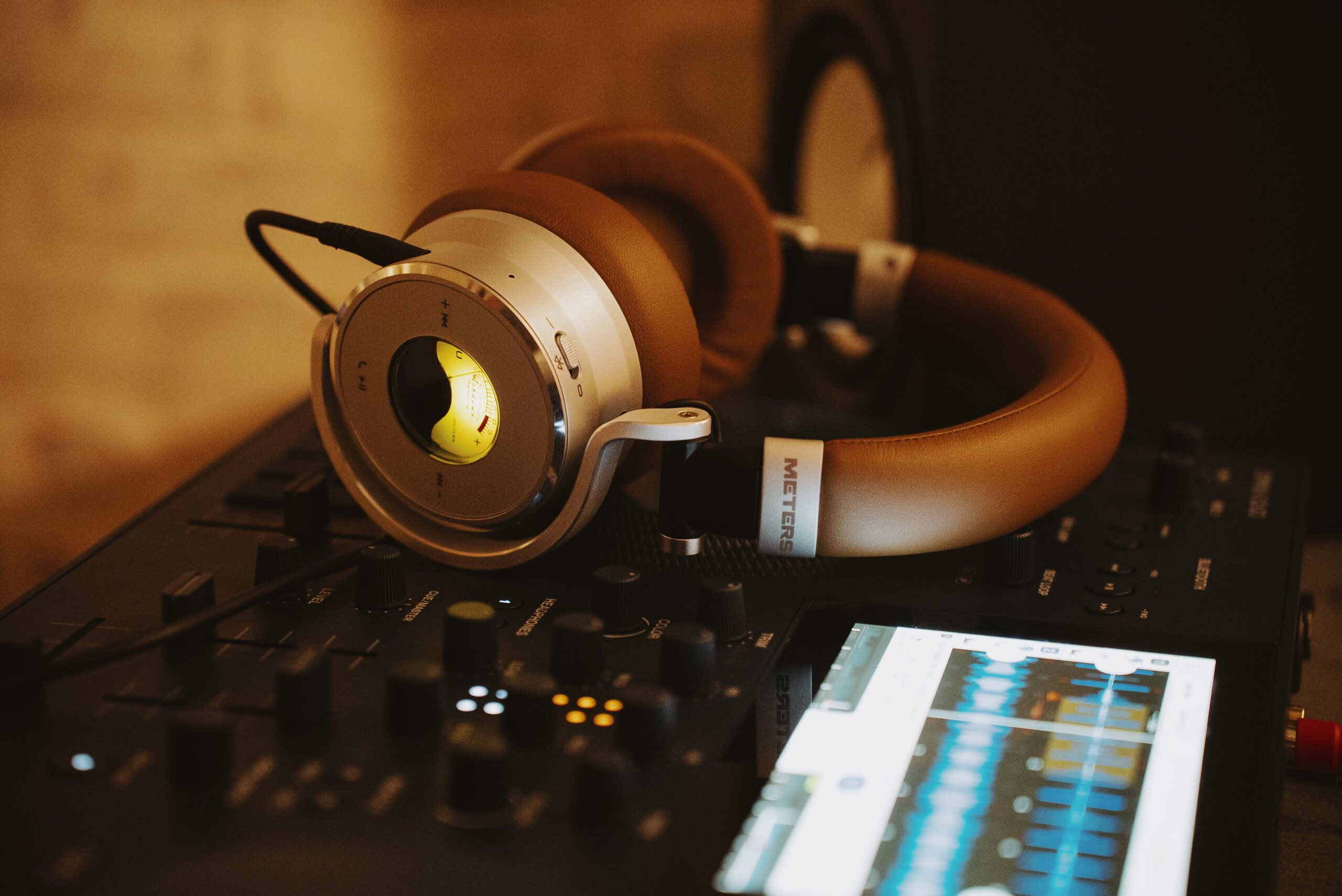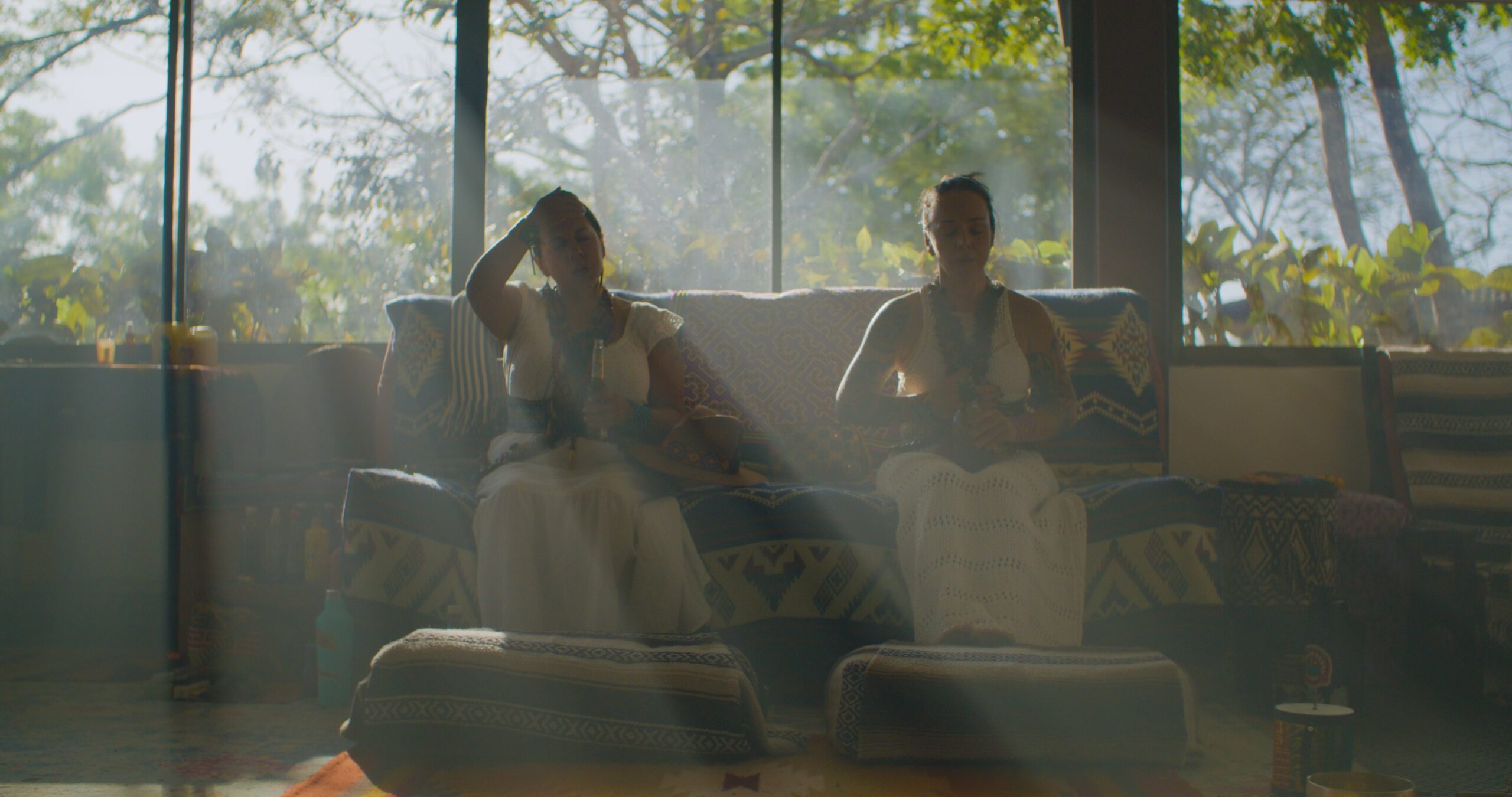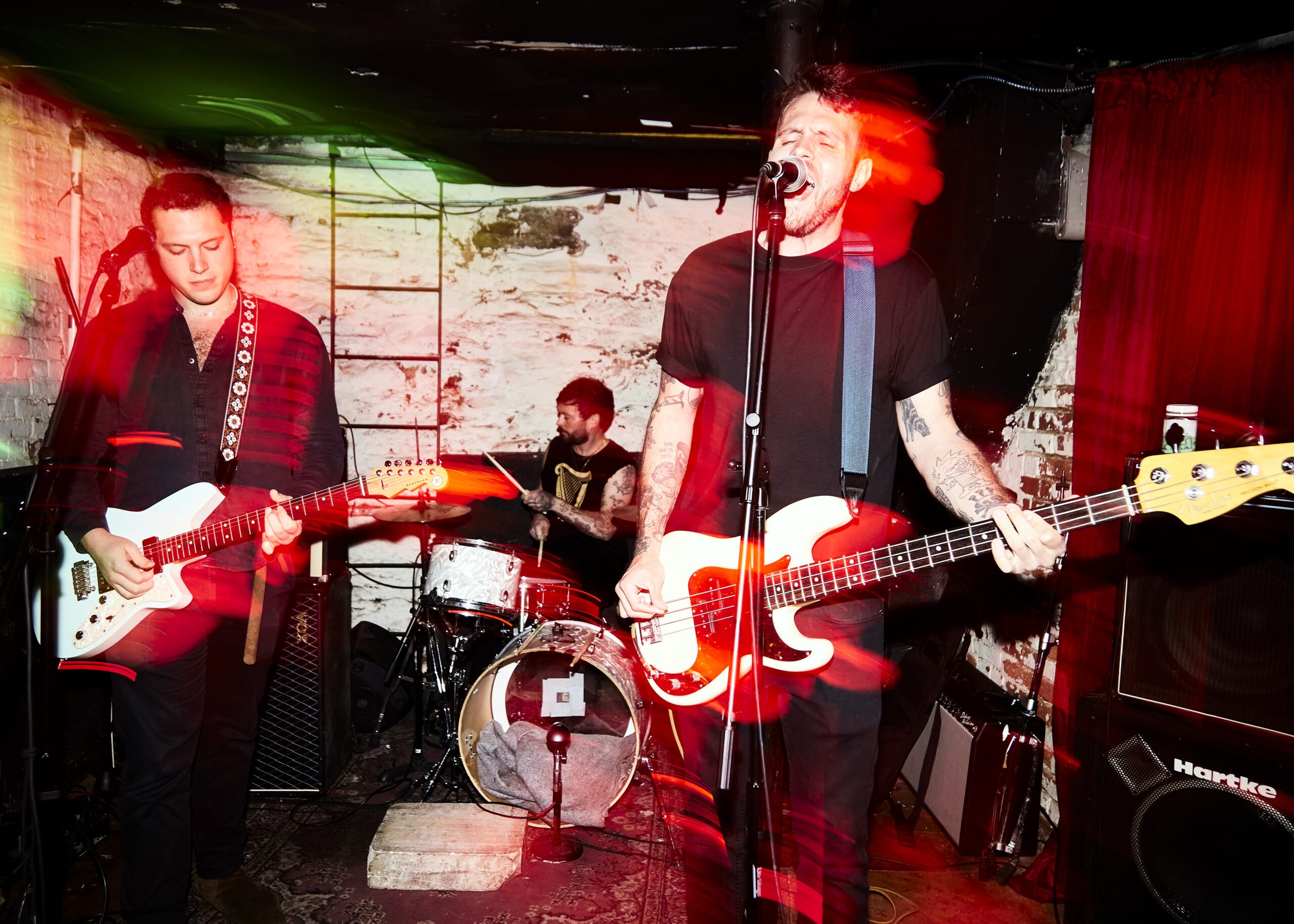
Now Hear This is a monthly A&R column that provides you with exciting new sounds we discovered through the innovative new music platform Groover.
Each month, you can expect a varied bouillabaisse of songs from a vast spectrum of artists from all over the globe, regardless of genre or geography.
More from Spin:
- Have a Safe ‘Trip’
- Meters OV-1-B-Connect: Excellent Sound with a Bold Design
- Say Hello to Producer.ai: The Latest Dimension of AI Song Creation
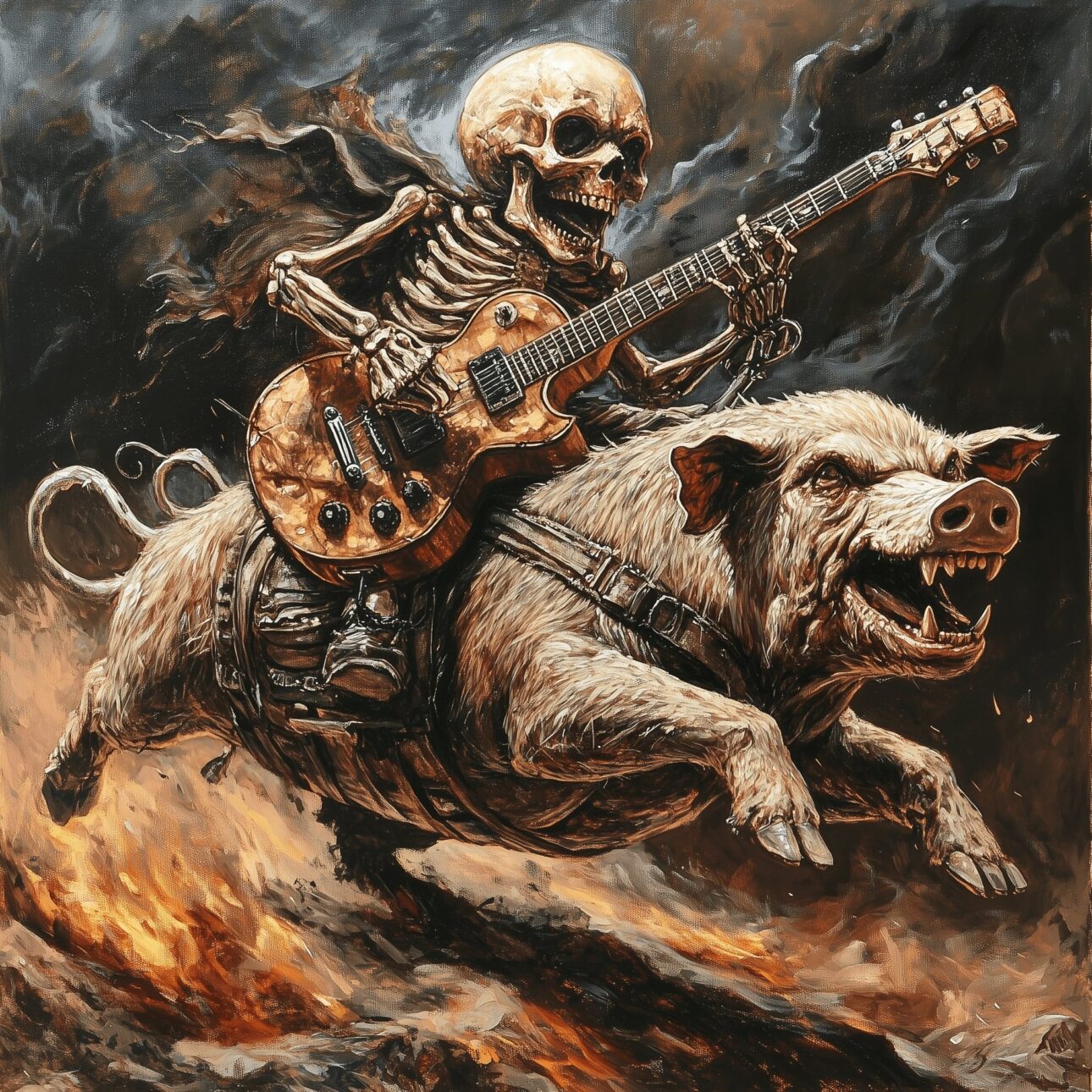
Hog Ryder
Sounds like: The anonymity of Hog Ryder, who characterizes himself as just an ordinary office worker from South Korea, only adds to the appeal of this crushing, unvarnished metal song that fans of Lamb of God and Mastodon will need to check out.
Describe your approach to music and how you would explain your sound to others.
My music-making process could be described as a journey of clarifying my own musical taste. Creating music entirely by myself made it clearer than ever what kind of music I truly love: “Tempo fixed at 80 BPM, guitar tuned to Drop C#. A main riff that’s heavy yet simple. And a breakdown section where drums, guitar, and bass all tightly lock into the beat.”
In terms of the actual process, I started with a variety of drum patterns, wrote around 130 different guitar riffs, and then gradually narrowed them down until I found the main guitar riff that formed the core of the song. After that, everything flowed naturally, almost as easily as breathing — creating additional riffs to support the main riff, or adding quiet sections for contrast. Every step felt natural and enjoyable.
Regarding sound, Foo Fighters’ “The Pretender” is my ultimate sonic ideal. I’ve been continually studying and experimenting to get closer to achieving that kind of sound.
How did you come up with the name of your act?
The band name, or my stage name, “Hog Ryder,” originated from a playful idea. I have a drummer and bassist who are like brothers to me and have spent a significant portion of our band life together. Teasing them has always been one of my greatest joys.
Lately, they’ve gained a lot of weight, and I wanted to tease them about it. Calling them “pig” seemed a bit too direct, so I thought of “hog” instead. And since I’m their leader, I figured “Rider” would fit perfectly.
However, “Hog Rider” was already taken by a very famous game character, so I ended up slightly altering the spelling to “Hog Ryder.”
What are some artists and albums that have informed your creative direction?
The band that has influenced my music the most is a South Korean band called Noize Garden. They play slow, heavy, crushing metal, and their album is the one I’ve listened to the most throughout my life. The first track on my new album, War Hogs is my homage to their music.
If Noize Garden has had the greatest influence on me mentally and spiritually, then as a guitarist, the musician I love most is Nuno Bettencourt. I’ve always dreamed of becoming like him, but about 20 years ago I realized that, as an ordinary office worker,
I could never actually become like him. Now, he’s someone I admire and cheer for from afar.
Another band I must mention is obviously Black Sabbath — their unique atmosphere always captivates me.
What’s the most exciting thing happening in music right now?
The most exciting thing for me in music recently was the Swedish band Ghost hitting number one on the Billboard charts.
It’s incredible to see a band with such a unique concept reach number one in the U.S. in the 2020s. Actually, if I think about it, my own album, The First Hunt, also tells a story based on a fictional concept I created. Of course, when I was making it, I wasn’t consciously thinking about becoming like Ghost.
Where do you see the music world heading in the next five years?
I believe the era in which musicians create music as they do now will end within five years — or at the latest, within ten years. In that new era, music listeners will create and enjoy music tailored precisely to their own tastes.
Even today, there are tools that can generate music based on individual preferences, but they’re still quite rudimentary. However, imagine how advanced they’ll be five years from now—or even ten.
Ultimately, in that future, all the music that’s been made until now will become learning resources, contributing to the process of discovering and refining personal musical tastes.
How is music helping you during these uncertain times?
It made me realize that I’m one of the very few people in this world who have actually achieved their lifelong dream. Everyday struggles, fatigue — these things have become trivial to me now.
I’ve accomplished my life’s goal of making my own album, and now I’m thrilled at the thought of creating a second one. Having another goal to strive for brings incredible happiness.
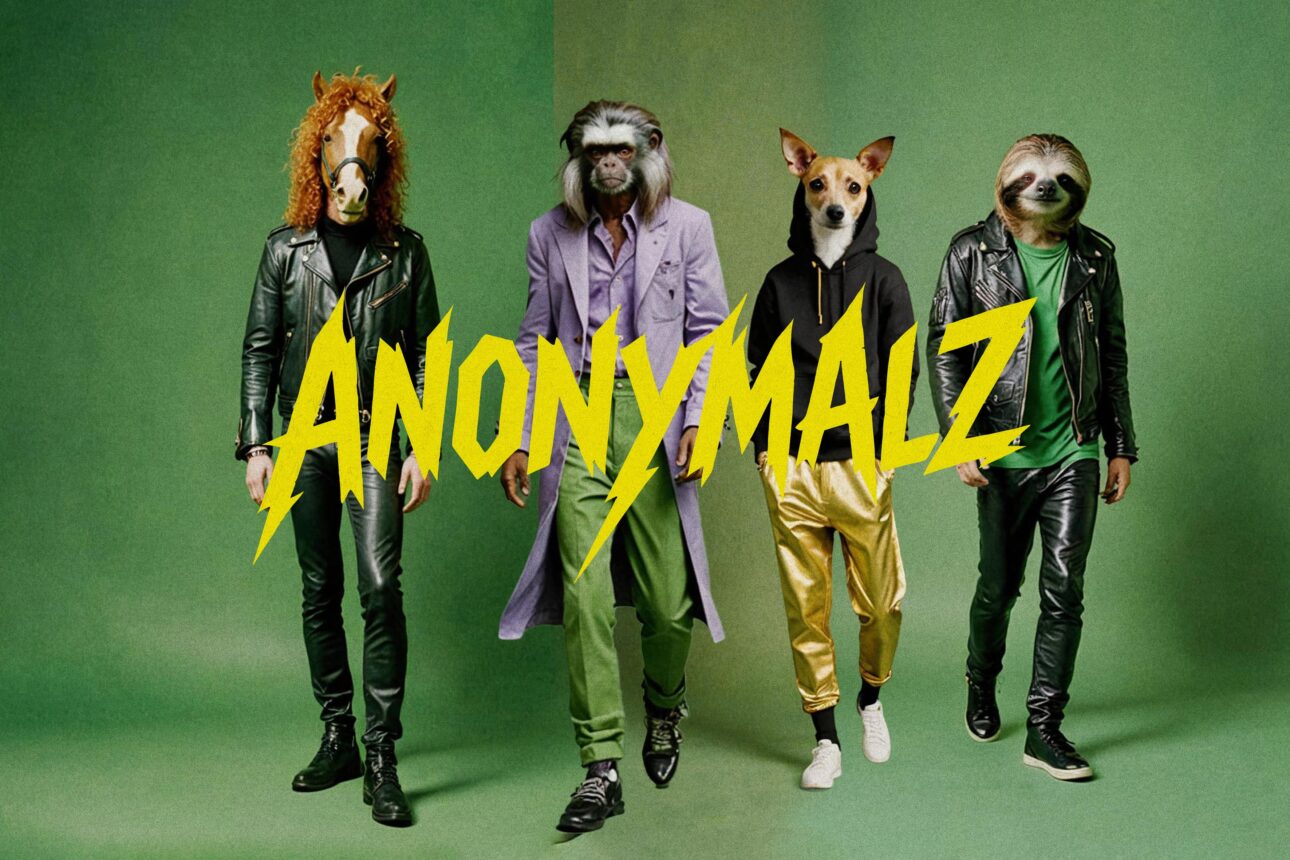
ANONYMALZ
Sounds like: A band who has managed to deliver something incredibly new and fresh to the industrial rock idiom, bringing the melodicism of Blur into a Ministry-like whirlwind of distortion and glitched out rhythms.
Describe your approach to music and how you would explain your sound to others.
We love contrast — sometimes even contradiction.
The raw energy of punk meets progressive structures…
Each track starts as a scar, a glitch, or a joke that went too far —
but from the start, we build music and imagery together, like two sides of the same hallucination.
We don’t just write songs — we design mutant scenes, inhabited by our shamanic avatars:
cartoon-rockers, extra-dimensional beasts, part glam, part grindhouse,
like a Saturday morning show that fell into the Upside Down, liked it, and settled down there forever after.
Our sound? Imagine a punk raised in a lost synth cult, left alone with a pile of guitar pedals and a VHS copy of The Goonies.
It’s noisy, theatrical, feral — but every distortion hides something fragile.
We build drama like it’s DIY surgery. Nothing clean, but always precise.
How did you come up with the name of your act?
ANONYMALZ is a strange little contraction of “anonymous” and “animals”.
It started as a silly joke about those random animal avatars on a cloud service… but then it stuck — like a good virus.
In our past projects, we sometimes hit ego walls or creative traps.
Becoming anonymous mutant creatures was a way to exorcise all that and re-enter music without filters.
Behind the masks, we can say anything: something intimate, something absurd, something loud, or wrong, or tender.
We used to think a lot about what not to do in music.
Now we do what we want to do — freely, wildly, collectively.
ANONYMALZ is not just a band. It’s a troop, a glitch lab, a camouflage.
It’s who we become when we stop making sense and start howling properly.
What are some artists and albums that have informed your creative direction?
We all come from different galaxies, but here are some satellites we orbit:
The Beatles (for the melodies),
Metallica (for the power),
Radiohead (for the fracture),
Justice (for the pulse),
Primus (for the twisted groove)
Suede & Portishead (for the drama),
Beastie Boys (for the wild glue),
Aphex Twin (for the glorious noise),
…and all the strange stuff that hides between categories.
We love albums that sound like they’re about to break in half.
What’s the most exciting thing happening in music right now?
It’s encouraging to see bands like Fontaines D.C. gaining international momentum with music that’s raw, literate and not designed for stadiums or car commercials.
That gives us hope.
We also recently discovered Foxwarren — truly original, subtle, and full of space.
It’s refreshing to hear artists who don’t play the algorithm game — and still connect.
Where do you see the music world heading in the next five years?
We hope people get tired of factory-made songs and plastic hooks.
Maybe they’ll start craving things that feel less polished but more alive —
imperfect, noisy, but sincere.
We imagine more bands blending genres, breaking forms.
More collectives.
More rituals.
Less products.
Maybe we’ll live in a world where even mainstream music stops being background noise —
and goes back to being a primal rallying signal.
How is music helping you during these uncertain times?
Music helps — and it always has.
Especially when the world feels like it’s falling apart and losing shape.
Just by scratching a guitar, chasing words in your head, finding chords on a keyboard or pounding the shells,
you end up slipping — almost unknowingly — into a state where time freezes and everything fades.
And nothing else matters.
But the music.
Some say the ancient therianthropes painted on cave walls were depictions of shamans in trance —
traveling to the beyond through rhythm and resonance, to heal or decode what the tribe couldn’t face.
Well…
ANONYMALZ is probably just the noise-rock version of that.
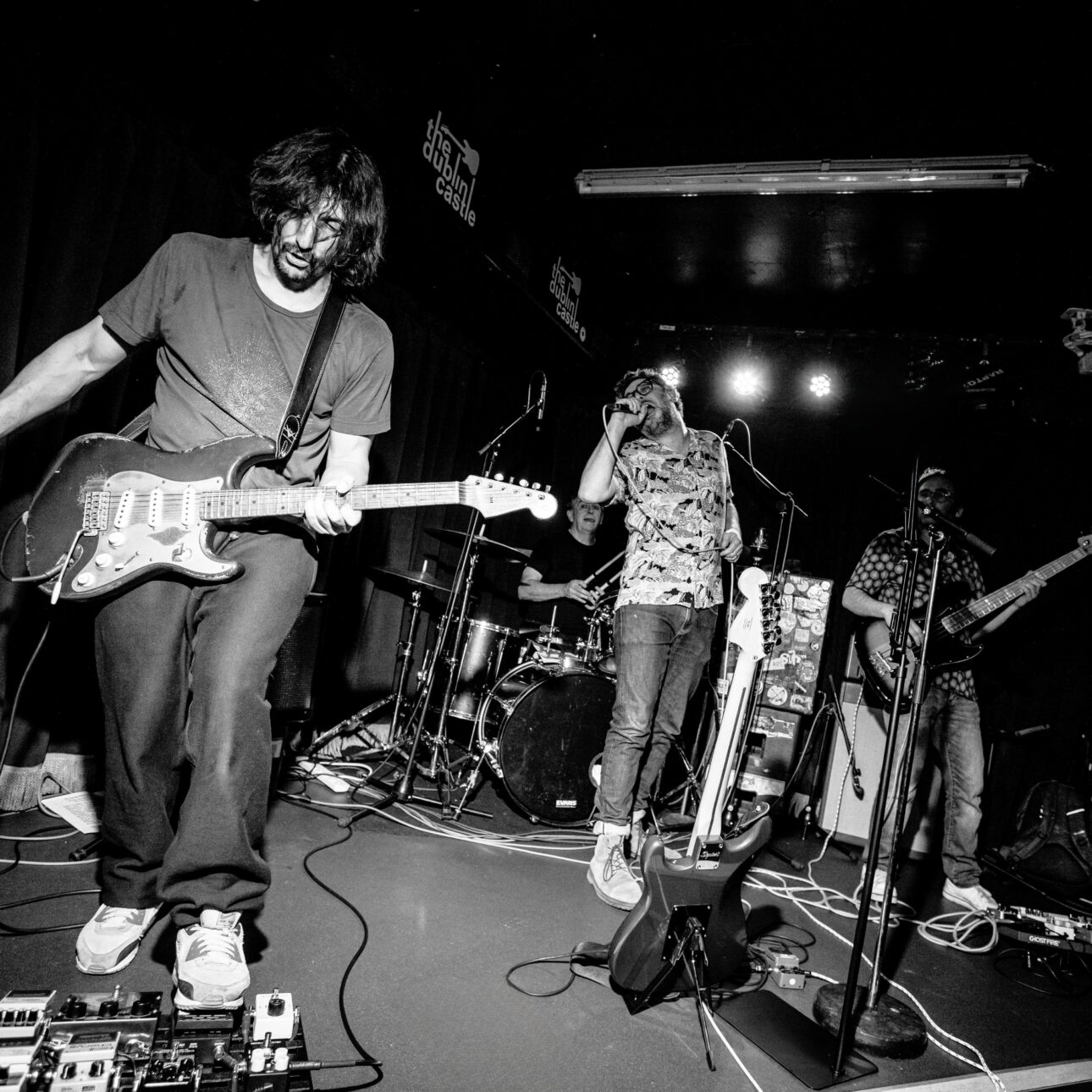
Truckstop Divas
Sounds like: Upbeat, swinging hard rock with dreamlike melodies that sounds like Queens of the Stone Age recording for 4AD.
Describe your approach to music and how you would explain your sound to others.
For the most part of our lives, I speak for myself but the others will agree for sure, all of us have been drowned in music — from our parents’ Beatles vinyl to the first Nirvana T-shirts — a deep, continuous and inevitable contemplation that has shaped our creative process. With all that life throws at you we were on or with music, in a way as natural and vital as breathing. As I try sometimes to explain it’s not something separate from life, but rather life itself transmuted into sound. Alt rock is in the middle of it all, with its energy, brutality, rawness and emotion. We grew up with it and we’ll most likely die with it. The upcoming album is the reflection of that multifaceted experience and contemplation. We’ve layered rhythms and textures, weaving together all the sounds and colours we’ve encountered. All our songs talk about different aspects and moments of our lives and the world around us. Life struggles, winners and losers, wars and love, each one of them becoming a thread in the larger fabric of our expression. Our creative process takes us through upbeat rock grooves to dreamy melodies, at times a mix of flamenco rhythms meets a rage against the machine l-style riffs. The whole beauty of it is this dynamic intersection of memory and perception, where the present moment draws from the depths of time — of 4 kids from the 90s — to generate something new and alive.
How did you come up with the name of your act?
We definitely didn’t spend as much time thinking about it as we did about the music! I guess Truckstop Divas is the combination of two words and worlds that don’t belong to each other. colours in the middle of the night, sparkles in the midst of darkness. Life in the midst of lethargy. I guess Truckstop Divas is this sort of singularity.
What are some artists and albums that have informed your creative direction?
Blood Sugar Sex Magik, Ten, OK Computer, Superunknown ,and the first Rage Against The Machine have been at the foundation of our sound, but then came The Strokes, Beastie Boys, Jeff Buckley, Vincente Amigo, Paco de Lucia and Jimi Hendrix.
What’s the most exciting thing happening in music right now?
Dirty aesthetic and raw authenticity seems to be making a comeback after years of polished aseptic productions. There is also this resurgence of live acts and the attractive power it has on audiences. It feels like there’s a major trend toward “dirty” or more authentic production styles — less polished, more raw and emotive — reflecting a renewed respect for imperfection, honesty, and vulnerability. This includes gritty club energy, punk attitude, and open discussion of personal and social issues in lyrics. We see a revival of the live scene around us in London, from basements in Camden to larger arenas that we wish to play. We feel like people don’t want to just listen to yet another playlist they want to go and experience music the way it’s made or should be made with all the emotions and the glitches that come with it. We are a live band, we play live, we exist live. That’s how we want our music to be heard and we’re glad to see that there is a revival of this pre 2008 era. At least in this part of the world.
Where do you see the music world heading in the next five years?
The next 5 years are going to be a decisive period for the music industry: As AI-assisted or even AI generated productions will grow larger and larger in volume, we are going to witness an inevitable clash between this later automated process of creation and a minority of pure human musicians. It will be the fight between an omniscient quasi-instantaneous process but aseptic machine vs a flawed slow but authentic human musicianship. Digital holographic shows vs sweaty and loud arenas. The Terminator vs Sarah Connor somehow! Will the audiences content themselves with the new overwhelming technological model or will they seek the authenticity of the human rebels! I’ll put my money on Sarah Connor here. At least that’s what I’d like to think.
How is music helping you during these uncertain times?
As years pass by my experience is that you come to realise that times are always uncertain so I guess it’s a question of when times are more uncertain than usual. People have different ways to react. Speaking for myself I’d say that I tend to regroup, I don’t get angry I don’t get stressed, I don’t blame. I tend to pause and reflect. And the energy comes out positive. Music helps me in that sense to process all the chaos and uncertainty and I guess makes sense of it. For some it comes out as a philosophy for me it comes out as a few notes on a guitar and a few lyrics on a piece of paper.
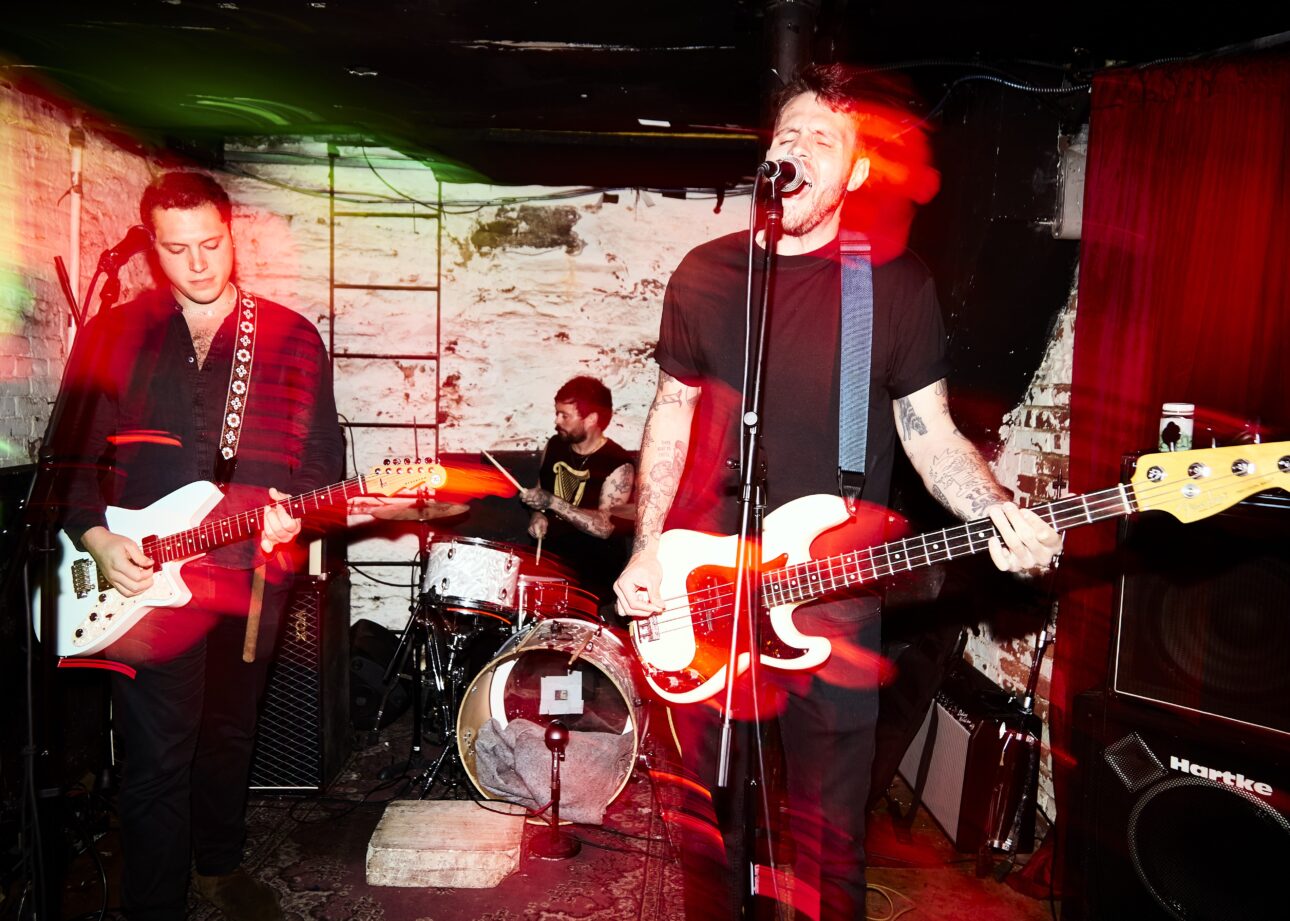
Smoke Break
Sounds like: Not only music that pays homage to the post-punk sound of NYC’s art ghetto days, but does so in such a melodic and catchy way that feels like an East Coast version of Social Distortion. If Coney Island High was still open, these guys would be playing there weekly.
Describe your approach to music and how you would explain your sound to others.
The approach varies entirely on the type of song we’re writing, the energy of it, and the melodic patterns. Sometimes Max will come into the studio with a riff he’s been working out on the guitar, Nat will have half-formed lyrics that contain elements that suit the riff, then a chord structure is built out that allows the lyrics to take shape, then pretty quickly we’ll have a song. Other times, Nat will come in with some piece of poetry or a story and no conception of melody or structure, and the three of us will jam on different ideas in real time until it comes together. On the flip side, Max will often come in with lyrics he’s fully built out and a much more concrete concept for a song, which Brendan and Nat quickly find an entrypoint to because it’s so well developed, as was the case with a new track we’ll have coming out this summer titled “Eyes” that Max takes lead vocals on. It’s a mixed bag but we’re learning to embrace the flexibility of our writing style.
How did you come up with the name of your act?
Max and Nat were in a band that predated Smoke Break, and when that dissolved they were looking to put something new together. Max was working as a barback around New York City bars, and historically the restaurant workers union has mandated a five minute smoke break for its members. We had the idea to call the project Union 5, given that we’re pro-union politically progressive guys and wanted our new band to reflect some of those leanings. We then decided that Union 5 wasn’t a good fit, but the concept we liked still, so we landed on “Smoke Break.”
What are some artists and albums that have informed your creative direction?
So many. Men’s Needs, Women’s Needs, Whatever by The Cribs; Dogrel by Fontaines D.C.; When I Have Fears by The Murder Capital; Bows + Arrows by The Walkmen; The entire discography of The Replacements; Original Pirate Material by The Streets. Magazine, Wire, Gang of Four. We have a single we’re working on right now that takes inspiration from Chet Baker, so we’re really all over the place.
What’s the most exciting thing happening in music right now?
Bands are starting to realize that there’s an out-of-control oversaturation of social media facing artists who exist to generate content and capitalize off it, but who aren’t particularly compelling or necessarily even “real”, insofar as they’re cooked up to get a lot of online visibility but don’t necessarily have an opinion, anything to say, or even much draw on the road. We’re feeling like there’s a new fire to build organic, tangible rock acts that hit shows, street promote, and go on the road, and build a following based on passion and love of the music. Fontaines D.C, Kneecap, Wet Leg, Amyl and the Sniffers, The Murder Capital, Idles, they’re all leading the charge on that, and it’s really exciting to see people following in their footsteps. New York City went from being totally chaotic and formless to being really competitive with bands building real followings again, which is beyond exciting and makes everything feel very alive.
Where do you see the music world heading in the next five years?
Hopefully following the trend of more tangible, meaningful, and intimate relationships between artists and the fanbases. Less social media fixation, more shows, live experiences, one to one relationships where people fall in love with an artist because they have something to say and love the music, rather than an absent-minded relationship of liking a fifteen second clip someone stumbled across while doom scrolling on IG.
How is music helping you during these uncertain times?
Keeps our minds and opinions sharp and engaged, keeps the blood flowing, helps process everything. It’s a form of shared meditation and protest expression for us. From a social-political perspective, we’re so repulsed and disappointed by so many of the things we see, that our country is responsible for or directly supports, the music helps us clarify our thoughts and get that anger out and hopefully get some people nodding to what we have to say at shows. We want to expand that in support of other outspoken bands who are much bigger than us, like Fontaines DC, Kneecap, etc. Independent music is one of the few public outlets where you can pretty much say what you want — and when artists are blacklisted or negatively impacted by exploring that outlet, as we’ve seen in recent months, it only calls for more energy and radical voices to step up to continue speaking. That’s our goal.
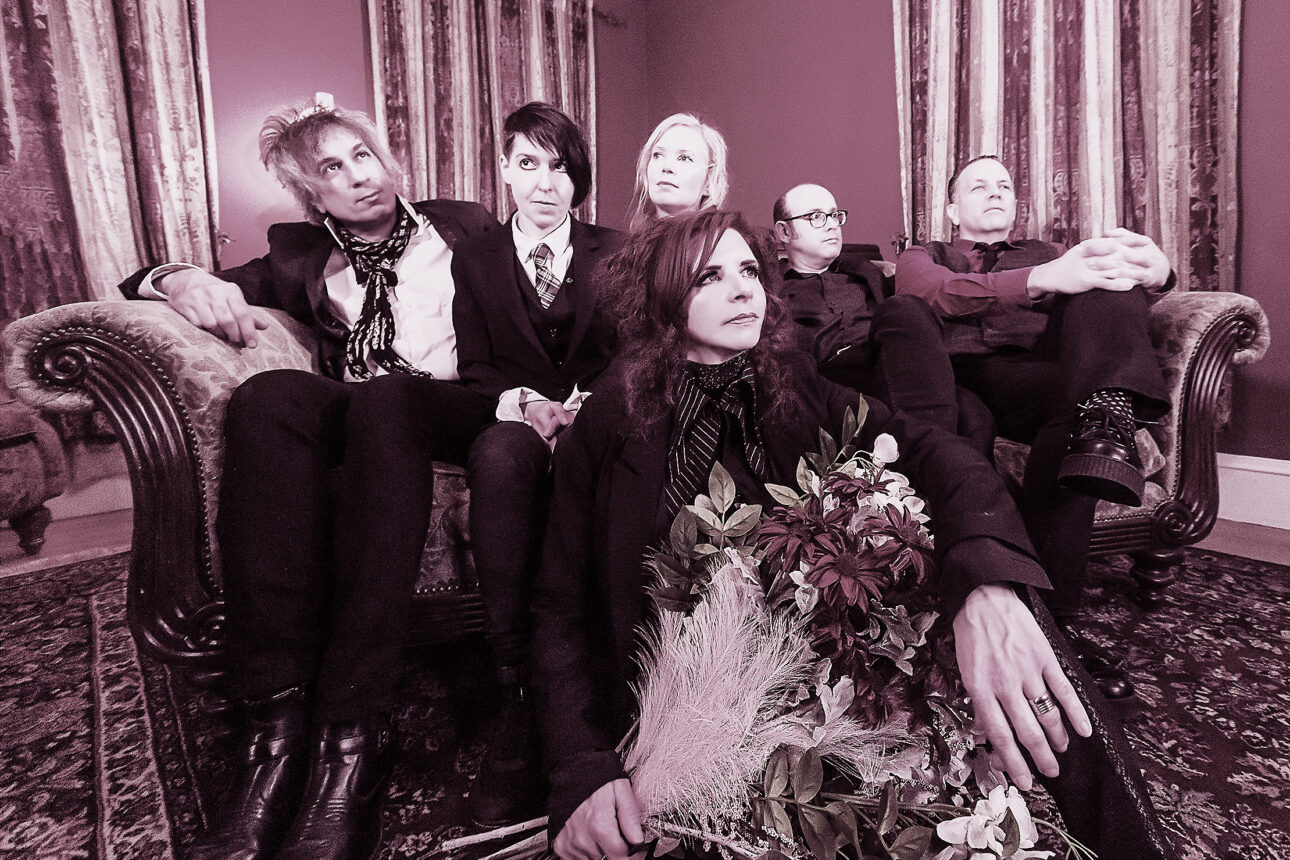
Lovina Falls
Sounds like: Upbeat dream pop with a timeless quality that fits perfectly with the lineage of great Boston-area alt-rock groups who came before them, as if Letters to Cleo and Mission of Burma were the same band.
Describe your approach to music and how you would explain your sound to others.
Writing for me is a process of trial and error and wandering around to see what happens. I was trained as a classical vocalist and pianist, but often begin a song with a sound and press record to see where things lead. It could be a piano, a musical saw, or a truck backing up – it’s really about instinct and opportunity and what’s on hand at any given time. For example, the single, Light and Low started on a harpsichord. In general, it’s a bit of alchemy, and all about how things support one another as opposed to how each can stand out. You might say it’s a sort of metaphor for my ideal world.
The process is the best part – building each individual brick to construct a house. Sure, there are easier and more efficient ways to create – but the trip to me is big part of what makes it so enjoyable. The other day I was telling our keyboardist how I used a violin bow, a bass, a distortion pedal, and an envelope filter to come up with 2.3 seconds of a particular sound I was looking for on this new track. She looked at me and said, “I so very much respect your process, but you do know that would’ve taken about 2 minutes on the synth instead of 3 hours?”
But how to describe the sound? The big question that plagues every artist, regardless of medium! We’re very much a genre mélange; we’ve been called “art house rock,” “dark dream pop” and “elegant baroque pop drama.”
How did you come up with the name of your act?
Lovina Fall was my great, great, great, great grandmother (I might be missing a ‘great’ or two there). My sister found her while researching our family tree, and I’ve taken a little creative liberty adding the “s.”
What are some artists and albums that have informed your creative direction?
That’s a tough question. I’ve grown up immersed in music, and was both a college radio DJ and worked in a record store. As such, I’ve been introduced to so much music it’s hard to pinpoint exactly what has had an influence. I think the most direct answer is I am inspired by everything and specifically artists who create engaging songs in unconventional ways.
There are those that stand out. The first time I heard the Cocteau Twins’ Treasure, I was hypnotized by the musical intricacies and the use of the voice as an instrument; The Birthday Party’s Prayers on Fire and subsequently Nick Cave and the Bad Seeds’ The Good Son — the intensity of expression and dynamics that tell a story in a powerful and cinematic way; Tom Waits’ Rain Dogs and its unique song structures, intriguing guitar, and creative percussion; Nick Drake’s Pink Moon, with its fragile vocals and magical alternative tunings; My Bloody Valentine’s Loveless and that insane wall of sound; Spacemen 3 and Slowdive, and the way sound can be both hypnotic and beautiful; Kraftwerk’s Radio Activity and how they bent and morphed electronic sounds along the way… and there are so many great artists out there right now reinventing, like DIIV, Alvvays, Fontaines DC, The Last Dinner Party… much more to discover.
What’s the most exciting thing happening in music right now?
I love the cross pollination of genres-so many new and different things happening in song structure, production experimentation, and blending of influences. I’m also excited about the 90’s resurgence we are seeing, and the rebirth of post punk and shoegaze reimagined through a new lens. Both new and old bands are being discovered – it’s a prolific time for music, IF you can find it! That said, while the offerings are massive, when you find that special link that takes you down a path of discovery, it’s a treasure.
Where do you see the music world heading in the next five years?
Well, I certainly share in the fear of AI taking over, but I believe that not everyone will actually want to hear music created that way. Music is experiential, and we are often fascinated, inspired, and moved by something created by another human. It’s important to remember technology has threatened the existence of all different kinds of art forms across time.
I told someone the other day that musicians are the quilters of tomorrow. Machines can make quilts, but isn’t it something special when you get one that’s handmade, and each square tells a story.
How is music helping you during these uncertain times?
We are a time of protest and escapism. I think music does both for me and for so many people. It’s far better to pour my disappointment into creation as opposed to either internalizing it or letting that frustration out in less productive ways. The new EP we have coming out in September is fueled by what’s happening around us-some songs are about being pissed off, and some are about stepping out and above what’s happening to appreciate each other, nature, and life. It’s hard not to feel powerless nowadays, so if I can contribute something through music that might resonate with someone, perhaps I can make a difference on a singular level. If something I’ve created might fill a small hole for another human, I’d be honored to make existence a bit more palatable, even if only for 3 1/2 minutes. We all need little moments of happy. ♡
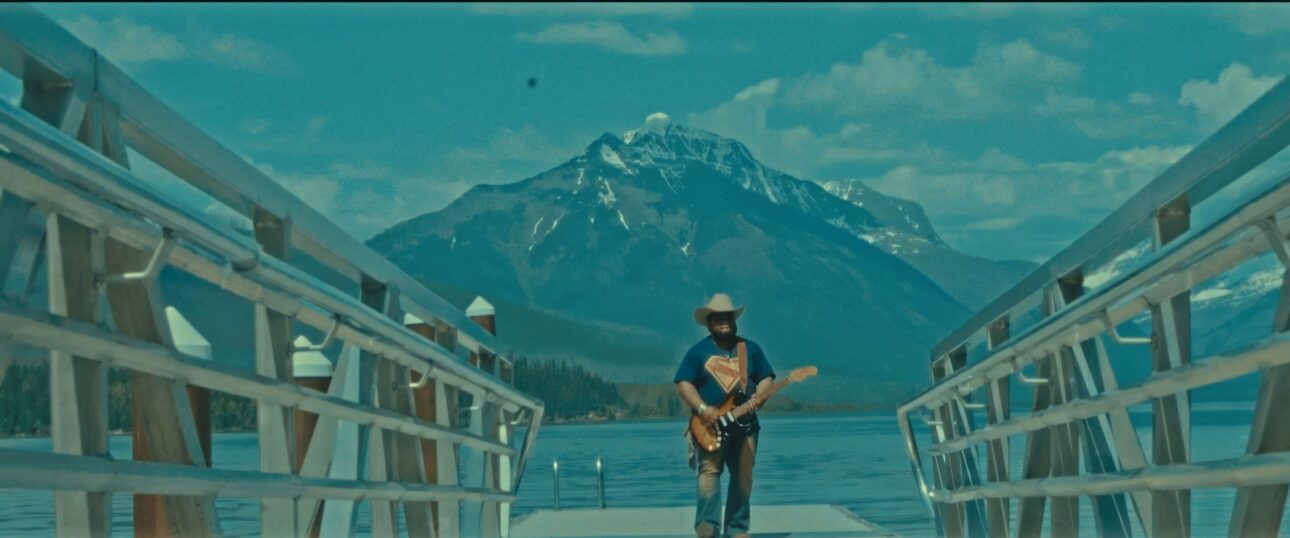
Duncan Daniels
Sounds like: An impassioned Big Sky blend of bluesy rock and modern country that radiates with exceptional guitar playing and honest songwriting. Fans of the Jeff Healey Band and Marcus King need to check this out.
Describe your approach to music and how you would explain your sound to others.
I treat music like storytelling across lifetimes — not just genres. My sound is rooted in Americana and Alt-Country, but there’s a cinematic, emotionally raw undercurrent that pulls from everything I’ve experienced — across cultures, identities and heartbreaks.
I call it Modern Western Soul — where dusty roads meet vulnerable truths. It’s that feeling of driving alone through the mountains with nothing but silence and a song that understands you.
My songs aren’t about trends — they’re about the weight people carry and the words they’re often too afraid to say. I make music that sits with you.
How did you come up with the name of your act?
I chose to keep it personal — because for me, music has always been intimate. Duncan Daniels isn’t just a stage name; it’s who I’ve become through sound.
Over the years, I’ve worn many musical hats — from Afrobeat to rock to orchestral ballads — but I’ve returned to the name as a home base. It’s my real name and my real story. No persona. No gimmick. Just art as I live it.
What are some artists and albums that have informed your creative direction?
I’ve always gravitated toward artists who don’t just sing—but bleed through the music.
Albums like Jason Isbell’s Southeastern, Bruce Springsteen’s Nebraska and Chris Stapleton’s From A Room shaped the soul of my songwriting.
But I also draw from outside the traditional Americana lane — Bon Iver, Hozier and even early Coldplay taught me how to build emotion in layers, to leave space where the listener can hear themselves.
I grew up between genres and continents. So artists like Fela Kuti, Bon Jovi and Kenny Rogers also left their mark. It’s a global soul filtered through an acoustic lens.
What’s the most exciting thing happening in music right now?
Honestly? The breaking of genre walls. We’re finally entering an era where artists aren’t confined to a sound—they’re defined by truth. It’s less about “What playlist do you belong on?” and more about “What story are you telling?”
Technology, especially AI, is accelerating creativity, but the hunger for real, human storytelling is louder than ever. That tension—that intersection between innovation and soul — is electrifying. Artists who know how to navigate both will define this era.
Where do you see the music world heading in the next five years?
We’re going to see a return to intentional listening. As much as short-form content dominates now, there’s a quiet rebellion brewing — people are craving deeper experiences again. I think we’ll see a resurgence of concept albums, visual storytelling, and emotionally immersive music that lives beyond algorithms.
Independent artists will rise even higher as communities shift away from corporate curation and toward authenticity and relatability. The future belongs to those who don’t just have followers — but have impact.
How is music helping you during these uncertain times?
Music has been both a mirror and medicine. During the writing of “Kryptonite,” I wasn’t trying to be clever — I was trying to survive. It helped me process grief, question identity and strip away the parts of myself that were performative.
In uncertain times, music is the only place I can be fully honest—and the irony is, that’s what connects us. The more personal I get, the more universally it seems to resonate.
Music doesn’t always fix things. But it reminds you you’re not alone in the wreckage.
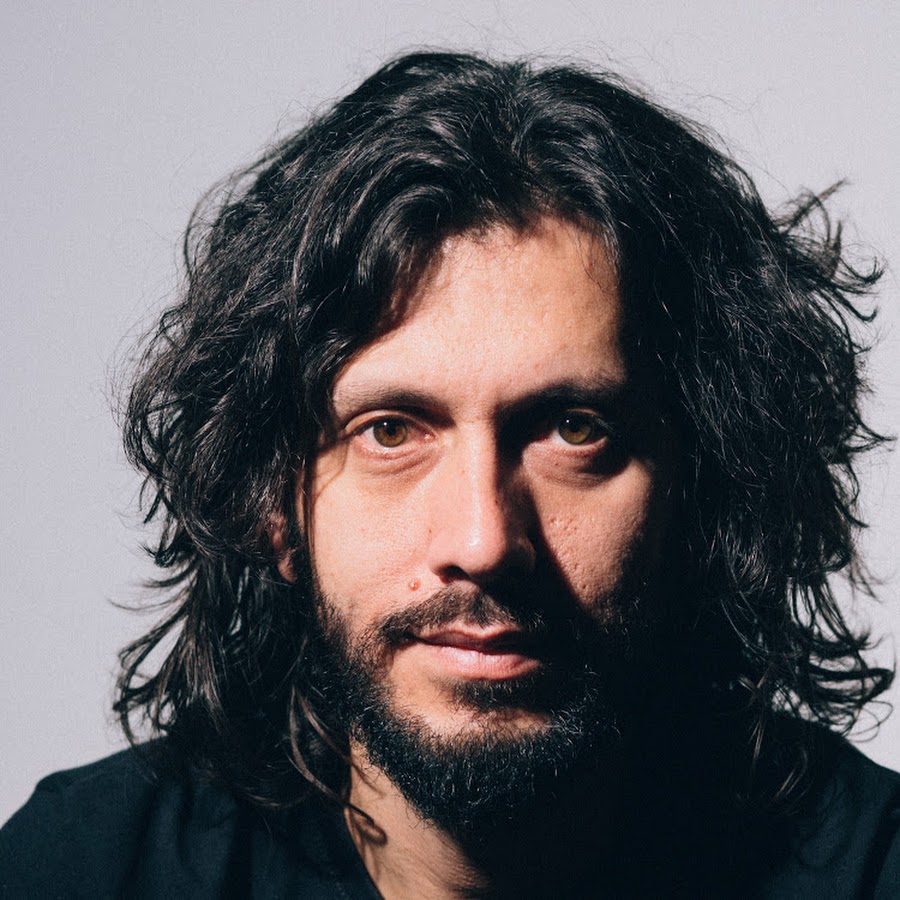
Muca
Sounds like: This is a fantastic combination of Bossa Nova and British Soul with a fast-moving jazzy sound that reminds me a lot of The Seatbelts’ soundtrack to Cowboy Bebop.
Describe your approach to music and how you would explain your sound to others.
When it comes to songwriting, I feel an idea can come at any second — usually when it’s least expected. The other day, I was playing with another singer I produce, and in between two songs, this riff just came out of the blue. It sounded quite nice. So, I always make sure I have something to record with or write on, so the idea doesn’t vanish.
I normally use my phone for that.
Then comes a more analytical approach — structure, tempo, and other bits. As a guitarist, I often think in terms of melodies, riffs, or chord progressions, and build up from there.
For this project, it was more of a collaboration on the music writing side. La Marquise du Cosmique and I went to the park to write some songs, and we actually wrote a few of them in just 20 minutes.
We also took a more unconventional approach to recording. We recorded all the tracks — acoustic guitar and vocals — twice, in separate rooms. The vocals were meant to be just guide takes, but I ended up producing and arranging the tracks using those versions, which ended up making the final cut for the album.
How did you come up with the name of your act?
The name came from the fact that the singer, although extremely talented, didn’t want to expose herself. So we decided to create a character for her — which, in fairness, in this era of social media overexposure, I think is actually a pretty cool thing to do.
What are some artists and albums that have informed your creative direction?
I’m old school when it comes to that. I like Hendrix, The Beatles, Miles Davis, Tom Jobim. I want to keep an approach that, although modern, stays rooted in the music of the ’50s and ’60s — with a fusion of jazzy, bossa and indie elements. If you listen to tracks like “Mango Tree” or “Cheap Red Wine,” they’re quite unique in that regard, yet still very much part of the album and its story.
What’s the most exciting thing happening in music right now?
I’m working on an extremely exciting album with one of the last living legends of the bossa nova movement — Mr. Roberto Menescal, who is 87 years old. This project is a return to my Brazilian roots and to bossa nova, but with a modern approach aimed at a new generation of listeners. The album will feature 12 different singers, with songs sung half in English and half in Portuguese. We’ve brought together some incredible vocalists for this project, and the musical connection between Menescal and me has been truly special. This album is going to make some waves.
Where do you see the music world heading in the next five years?
I believe more and more artists should think on a macro level and build from there. There are eight billion people on the planet — there’s an audience for your music, whether you make doom metal or lullabies. What I think many artists are really struggling with is this: on one hand, they have the tools to market and release music independently; on the other, they’re overloaded with admin work and left with little time to actually create.
When it comes to AI, there’s definitely an audience for it. But if we shift focus to something more micro — like vinyl — there will always be a large group of people who want to connect with real music and real artists. That’s the human connection, and it still matters.
How is music helping you during these uncertain times?
As someone making a living from music, I have a different perspective. These days, it’s challenging to earn a living through music — but it’s in my blood. I can’t be anything else but a musician and producer.
Maybe for the audience, it’s different. Music soothes the soul, for sure. In my opinion, life has always been uncertain throughout human existence. As Jim Morrison said, “The future is uncertain and the end is always near.” So live as fully as you can — you never know what will happen tomorrow.
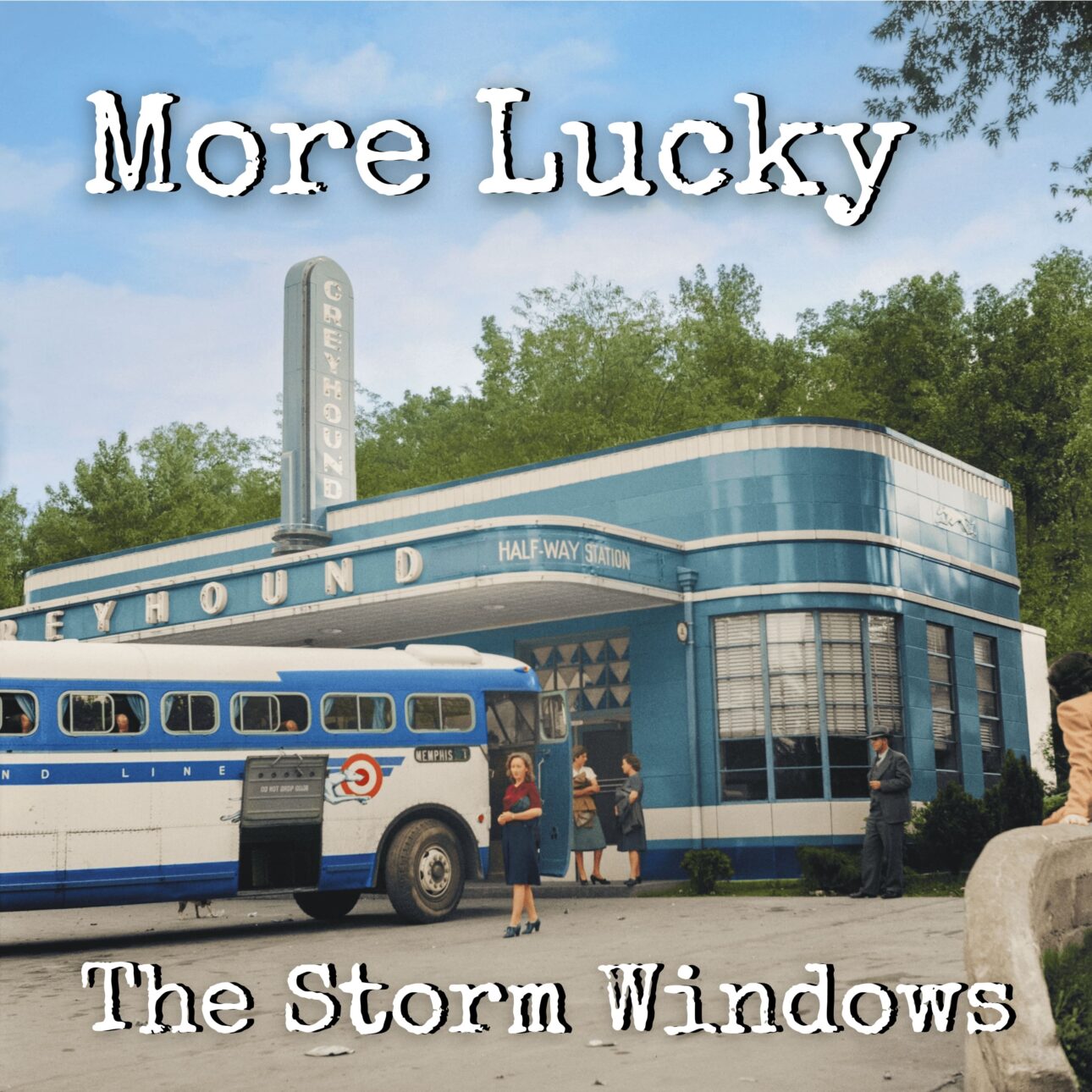
The Storm Windows
Sounds like: New York-based Americana rooted in classic John Prine and The Band, which feels like a Greyhound trip up the Northway to the Adirondack Mountains.
Describe your approach to music and how you would explain your sound to others.
A critic recently called our music “New Americana.” We don’t know exactly what that means, but we like it. In our live shows, we explain that our songs fall into three categories: road songs, sort-of-love songs and “other.” Don and Rob have played together for a long time now, including a long-term residency at the now-gone Black Fence on the corner of Bleecker and Thompson in Greenwich Village. It might not be the Kaiserkeller in Hamburg, but we got in a lot of practice. Someone else called our live act “the folk Ramones.” We also like that.
How did you come up with the name of your act?
The band takes its name The Storm Windows from a song title of one of our musical heroes, John Prine, but also as an appropriate description of some veteran musicians who have weathered a few storms but are still standing and singing about it. When we regrouped in 2022 after a long hiatus, we thought the name fit the new project. And it helped that it wasn’t taken.
What are some artists and albums that have informed your creative direction?
We are big into lyrics and melody, so the usual suspects. Introspection is good (Joni Mitchell). Humor is a bonus (John Prine). Nostalgia is good (Bruce Springsteen, among many other noteworthy attributes). Sorrow is also good (also known as Country). Harmonies where you can pick out the voices (The Band). Then there’s the Grateful Dead and Phish. That’s the start of a long list.
What’s the most exciting thing happening in music right now?
People want to hear live music. We are just as happy playing a disjointed bar gig as an attentive auditorium performance, as long as people are having a good time.
Where do you see the music world heading in the next five years?
AI may be a threat to music (and the world) as we know it, but as it changes the musical landscape (for better and for worse), it’s going to create opportunities. In particular, opportunities for something that’s authentic. That’s us! We’re hoping to play on that bandwagon. Very soon, there’s going to be a before and after, and in the “after” real people playing real music will be the value proposition.
How is music helping you during these uncertain times?
Our next single is a song called “America 250.” We try to explain it in that one. There is a hard balance between acknowledging what’s messed up about the world and not losing hope and faith in the promise. It helps us to sing about it.
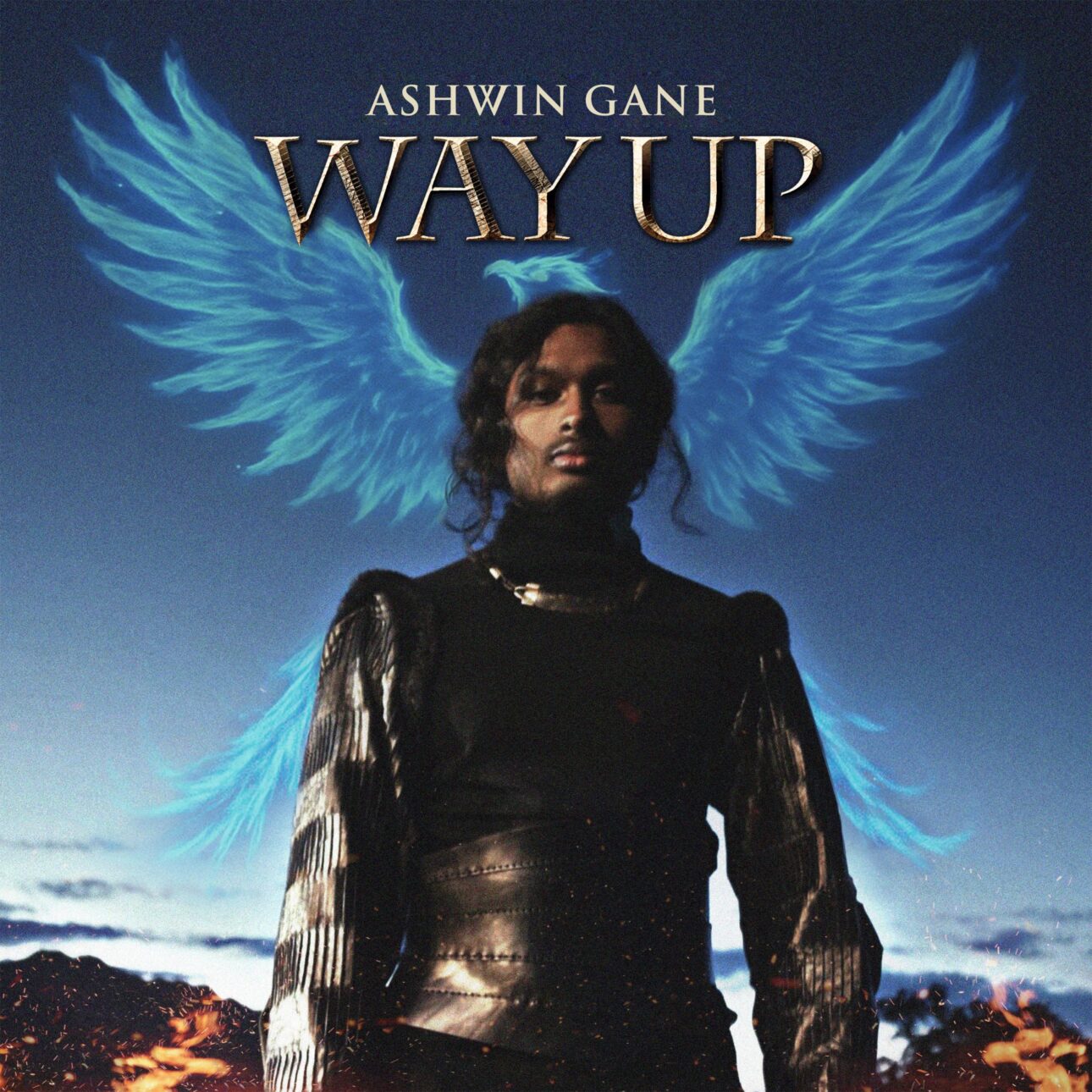
Ashwin Gane
Sounds like: The new wave of Detroit hip-hop, blending synthwave melodicism and trap-style headiness to craft a melodic twist to the sound pioneered by the likes of Travis Scott and A$AP Rocky.
Describe your approach to music and how you would explain your sound to others.
My approach to music all starts with typically having a scene, world, or mood in my head. I then produce the track—of course with the hip-hop flair. For example, I may want to score an ‘80s slasher flick, so I create a track based on that, and if I don’t know how to do it, I figure it out. It’s very much rooted in world-building.
My sound is multi-faceted. I did smooth, luxurious R&B and pop rap on songs like Energy and my Got It EP. Let’s talk about the Twilight Tales EP for a moment—I describe half of that project as containing my signature production style: gothic, eerie, dramatic, classical, film score-tinged orchestration, which you can hear on tracks like Regret It and Outside. The other half is what I consider a homage to the late 2010’s SoundCloud era, with the alternative grunge influence, distorted 808s, pained grunge vocals, and John Carpenter-style ‘80s horror synths.
As a vocalist, people know me for my deep, baritone, resonant vocals, which—while melodic—do have some grit. You can hear this on songs like Got It, Twilight, and Flip Dat. Of course, I’m versatile and can hit higher notes too, which you can hear on Milli-on, Who’s Watching, and many songs on Twilight Tales. Overall, I’d say Twilight , a song I wrote with Poo Bear, is the closest to my signature sound, despite being an earlier work
How did you come up with the name of your act?
I used to be known as The One ATG/The ATG. I’ve since decided to go with a variation of my real name to give authorship to what I create. Even though I often play characters in my songs, people need to know who the man behind them is—who the director is. That’s why I decided to go with this name.
What are some artists and albums that have informed your creative direction?
Overall, Dr. Dre’s 2001 has been a huge influence on me—the perfectionism, cinematic quality, and clarity of that album is something I strive for. As I mentioned before, for Twilight Tales I was inspired by artists like Travis Scott, Kurt Cobain, and Juice WRLD for the grunge/SoundCloud aspect. “Got It” was inspired by contemporaries such as Drake, but with a Barry White flair in terms of vocal tone and smoothness.
As a vocalist and overall influence, I look to Pop Smoke, 50 Cent, Future, and Dr. Dre — some of that connection is simply because of similarities in our voices. I’ve also been looking into Johnny Cash for future work. On a broader level, Viva La Vida by Coldplay is a benchmark for the kind of impact I want to achieve in hip hop. And beyond that, I’m heavily inspired by composers like Hans Zimmer, Bach, Mozart, and Beethoven, as well as avant-garde classical projects and film scores like The Green Knight OST (which you can hear influences of on Outside), The Witch and The Lighthouse soundtracks.
What’s the most exciting thing happening in music right now?
“The merging of genres and the rise of cinematic storytelling in music is exciting to me. We’re at a point where artists aren’t boxed in—you can drop a track that blends trap, rock, orchestral elements, and R&B melodies and it’s accepted. Fans want authenticity and vision, and that shift towards more narrative-driven music feels like the future.”
Where do you see the music world heading in the next five years?
I see the major label system shutting down and splintering, with artists being forced to become independent. The power is shifting toward creators who can build their own ecosystems and control their narrative. In the next five years, I think independence and self-sufficiency will define the music world.
How is music helping you during these uncertain times?
Despite these uncertain times, music and media definitely provide an escape. But for me, it’s more than that—I have a mission I’m working on in terms of my message, music, creativity, and world-building. Knowing that I haven’t fully accomplished what I’m meant to yet is what keeps me going despite the uncertainty.
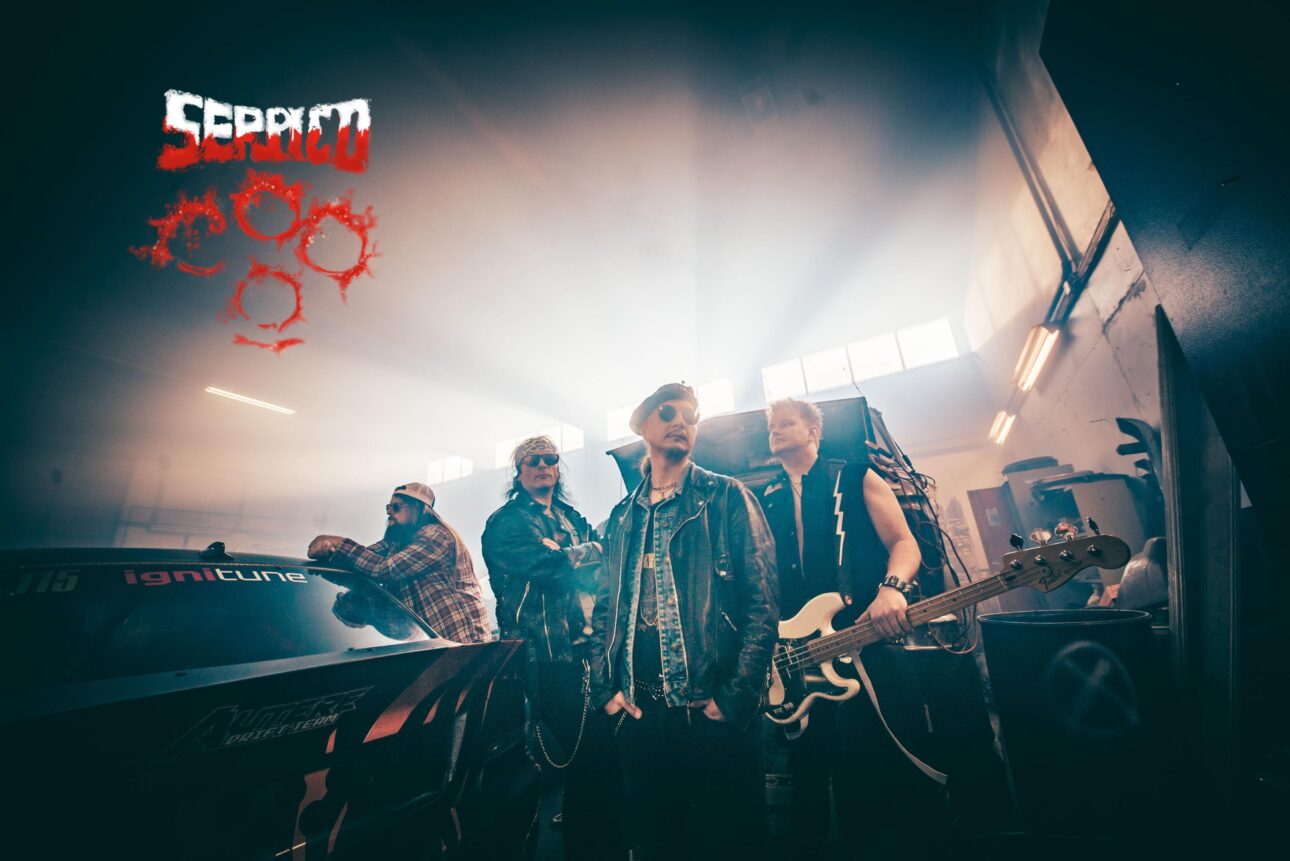
Serpico
Photo: Attached
Sounds like: Brash, confident, streetwise hard rock boogie out of Finland, highly reminiscent of their legendary fellow countryman Michael Monroe.
Describe your approach to music and how you would explain your sound to others.
Vee Dour: I think we’re on the mission of not god but to improve this kind of music scene by showing people, especially the younger generation, and reminding older people who may have forgotten these things. Rock music is doing well as it was in the past and it can produce all kinds of feelings when hearing it.
We decided to do things honestly following the examples of an analogue recording era’s monsters. And when it comes to our sound… At first our producer Anssi Kippo taught us secrets of playing together, having his whip swaying metaphorically speaking. He helped us to realise whether it was kind of a harsh method that actually you are not following at all what type of things your fellow mates are creating with their instruments and precisely when they’re doing it. We kind of knew these things already but didn’t acknowledge it entirely. Things that you feel and somehow hear with your body, you know. He made us realise that music comes directly from us. It’s not just playing notes, it’s way more than that. It has to create some energy burstings out of the instruments and voice. We don’t need any voice tuning or plug-ins to capture these kinds of things on the reel. It’s us only. Of course Anssi as an engineer and producer has so much professional talent dealing with the sounds, helped us to find our own thing also.
Matt Gee: Well since Snage and Vee Dour are our main songwriters all that’s left for me is to learn the bass parts of each song and maybe sometimes add things of my own in the mix. I would say our sound is very organic and clean. What you hear on a record is what you get when you come to see us live.
Snage: I think, as a band, we try to play organic rock ‘n roll with same kind of passsion and reverence for rock ‘n roll that our idols and their idols used to have. We don’t try to sound “vintage” for the sake of sounding old, but i think it’s something that comes naturally for us.
As a song maker I love strong melodies and try to make them as catchy us possible. Audience should know the chorus second time they hear it, otherwise I think that I have failed as a composer.
And as a guitarist I like my stuff as controlled chaos. Playing super clean and flawless has never been something I enjoy, not listening or playing. My personal guitar heroes all have some kind of unpredictability and danger in their playing. I never chose the sound and style i’m playing. I think it chose me.
Jani Serpico: I’d say that our music is as genuine and honest as it can be and we are making & playing it with full heart and unconditional passion. I agree with… actually I don’t remember at the moment who musician said this, but anycase: You have to do/play that kinda music which gives you the most satisfaction. Then you are honest for your self and obviesly you’re not faking it for the audience.
How did you come up with the name of your act?
Vee Dour: Well, if you mean the title of our soon releasing album Dressed in Flesh, which comes out in September… you can find it on the lyrics of the first single release to the album “Hard as a cannonball”. It’s not quite word to word but it is there on the first verse.
Matt Gee: Allegedly the name “Serpico” was given by the bands original drummer Jaakko Kakko back in the day. He named it after the Al Pacino movie. However, I just recently learned that it means “snake” in Italian. That’s really cool!
Jani Serpico: In fact, after all these years, “Serpico” has somehow gained a real meaning for the band’s work. Serpico was the only policeman who couldn’t be bribed in the movie. Jokingly, we can also think that we are one of those bands that doesn’t sell themselves just for the sake of fame. It needs to be earned, If such an opportunity is ever granted to us.
What are some artists and albums that have informed your creative direction?
Vee Dour: For me personally Blue Ӧyster Cult’s album Spectres is a decent guideline to remind me how good the record should be and how high I should aim when composing the songs and entire album. I think it is close to perfection. But still I wanna name a few great ones I look up to: Alice Cooper and Iggy Pop, (great live performers who are still going), Aerosmith (their playing together live was dynamite), Ray Davies from The Kinks (well-underrated genius in composing, writing and producing the music), David Bowie (do what you wanna do and people will follow you).
Matt Gee: Well the ‘80s glam rock bands were the first ones to get me excited and want to play bass. Seeing Gene Simmons and Nikki Sixx rocking on stage in their high heels and cool looking instruments was somewhat mesmerizing to me as a kid. But as far as our band’s sound goes I’d say there’s a lot of elements from GNR, Aerosmith for example…
Snage: There are so many beautiful records that naming them all is impossible. I love all kinds of music and try to draw influence from everything I listen to. But GnR Appetite and Illusions of course. Everything Ozzy in the eighties and nineties. AcDc for the groove. Old Aerosmith. Everything Jimi, EVH, Dimebag, Gary Moore, Neil Young and the rest. And my personal hero for songwriting is the late Jussi Hakulinen from Yö.
Jani Serpico: My biggest heroes in music comes from rock n’ roll such as: Led Zeppelin, Ozzy/Sabbath, Rolling Stones, Aerosmith, Hanoi Rocks, GN’R, Motörhead, Iron Maiden, Bowie, Van Halen, RATT, Stray Cats… also I love older rock n’ pop music like ‘50s rockabilly/rock n’ roll, doowop, ’60s rock etc… aaand I love oldschool punk n’ heavy-metal. But overall my music taste is large and I can listen to everything from jazz to black metal. All the stuff which sounds good to me, inspires me. Gotta say that the albums which has the biggest impact on me must be: GN’R: Appetite for Destruction and Use Your Illusion 1 & 2 ,Hanoi Rocks’ Two Steps From The Move, Michael Monroe’s Not Faking it, All Motörhead albums, Ozzy: No More Tears, Tehosekoitin: Köyhät syntiset (Finnish rock band)… There’s so many of’em but just a few.
What’s the most exciting thing happening in music right now?
Vee Dour: Aside from our forthcoming album and a third single release? I occasionally say that the internet may hold some good side effects. There may be some signs that people are awakening a bit at least. Youtubers, and by that I mean real professionals who have long careers with music (producers, engineers etc.) are talking about the state of music right now and they insist on some passion and human feelings getting involved.
Matt Gee: Well it’s exciting to see if more bands will turn back to analog recording like the old days. I saw some article that at least KORN is planning to make a full analog record. Let’s hope that more bands realize how much better it sounds and how much more is conveyed from the music to the listener.
Snage: One genre of music which really ain’t new per se, but has gained grounds in the recent years is Female fronted occult rock bands in the spirit of Coven. Jex Thoth, Sabbath
Assembly, The Devil’s Blood and the most recent band whose record I purchased, Castle Rat. That’s a “modern” genre I enjoy.
Jani Serpico: Yeah, People are starting to wake up to the fact that music actually sounded better in the past. You used to be able to tell which band was playing on the radio by their sound or playing style. Nowadays, that’s impossible because everyone uses the same plug-ins, computer-based modeling sounds, and autotune, that’s why there aren’t any more classic albums being made. But like Matt said, it’s awesome that big names like KORN are planning to record an album in full analog. I hope they’ll do it all the way analog, mastering included as well and not with the computer.
Where do you see the music world heading in the next five years?
Vee Dour: I have high hopes that this is just a phase that reaches the end soon.
And people in the near future stand up for the music even more. I hope they have the same thing with music as they have with food; when they wanna know how it was produced, is it all natural and how it was made. Yeah, I kind of say this tongue-in-cheek but why not?!
Matt Gee: Well at least we are here to keep rock ‘n’ roll alive, genuine and even dangerous. And history has a tendency to repeat itself so hopefully we’ll see a new golden age of rock n roll in general!
Snage: Of course the big question is the advance of AI. It seems scary on the surface, but I tend to be optimistic about it. AI is going to take away jobs from many working in the artistic industry, but I think it’s mostly going to affect those in the Pop music field. Most top 40 hits
are already just Muzak to silence your thoughts and keep us occupied in our mundane little lives. Something that is a background noise, a distraction, not something to really listen to or to marvel and find joy in.
So I think good music made by real humans is never going to go away. The rise of AI might even be a blessing in disguise. People will grow bored of AI generated crap and start to resent it. Then they will return to real music as they start to once again appreciate the raw human emotion a machine can never create. Human made music might even be seen as a luxury product, a filet mignon of music.
Or then again, there’s a chance that nobody will listen flesh-made Rock N Roll anymore and just
stare their VR classes as their new favourite AI overlord peforms in AI-generated Wembley Stadium new Queen songs in the style of whatever text prompt they entered.
Jani Serpico: I would like to see another golden era of rock n’ heavy metal! It was so amazing when we lived it in our childhood. It’d be so great to see kids getting excited about something creative instead of making TikTok and YouTube lip-sync videos. And I’m talking about all the great new rock n’ metal bands out there. I dare them to try out the full analog recording method, so they can really work for their own impactful and unique sound.
How is music helping you during these uncertain times?
Vee Dour: It helps a lot. I have always been since my childhood times A.O.R.
-guy. I have a great respect for well-played whole albums. I listen to music on my turntable almost every day to ease my anxiety from the radio stations that I am forced to listen to outside my home when I collect financial support for my passion and for living.
And in our band I am allowed to express my thoughts by composing and writing the lyrics. Talented writers can hide extra meanings, how they look at the world, and what they think about uncertain times, lyrics in a sophisticated way. That is what art is about. And when we’re playing together I can spill extra energy on the stage that is left from me and it gives a boost to my fellow members.
Snage: Well at least it’s not making things worse….
Jani Serpico: I listen to music every day like I’ve always done. It’s the only real escape room from this world of insanity where people are fighting and wage war against each other.
Groover connects independent artists with music industry professionals to accelerate their careers. Their goal is to empower independent artists by providing a platform that connects them with the best curators, radio, media, labels and other music pros to receive guaranteed feedback and exposure.
Over 500,000 artists use Groover to connect with 3,000+ professionals across the globe. Artists have received over 6M+ pieces of feedback, 1M+ shares (e.g. playlists, reviews) and 1,500+ label contracts — all thanks to Groover!
To see our running list of the top 100 greatest rock stars of all time, click here.

